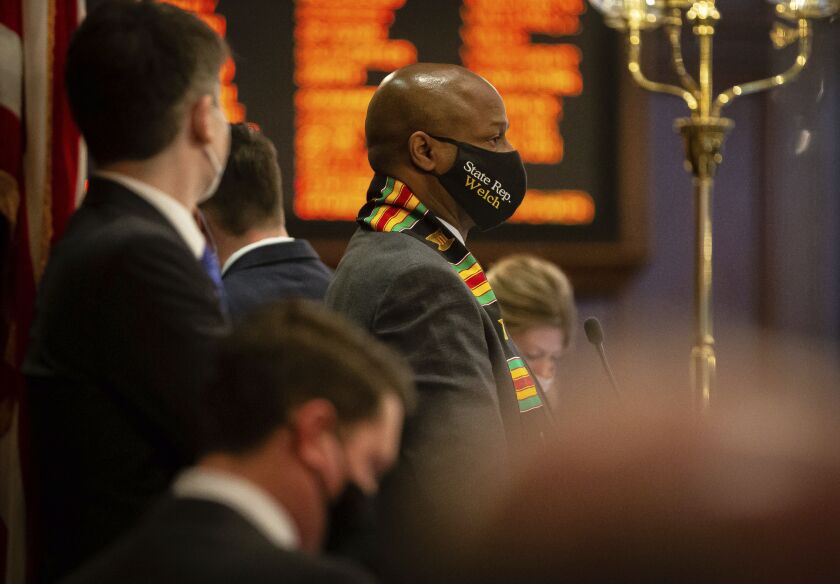The Illinois House plans to return to Springfield Thursday after negotiations on long-stalled energy legislation appeared to have moved forward.
But lawmakers who’ve been at the table over the past few months say that while they’re hopeful of finally passing a bill on Thursday, there’s still one detail, related to carbon emissions targets, to iron out.
As thorny as that issue has been, state Rep. Ann Williams said conversations are “ongoing,” and she thinks it’s “possible” the sweeping legislation will pass Thursday.
“We’ve been talking about the same issues for not just months, but years, and everyone has the same sense of urgency,” the North Side Democrat said.
House Speaker Emanuel “Chris” Welch on Tuesday called the state’s lower legislative chamber back to Springfield for a session Thursday, saying he is “pleased” to see negotiations on the energy legislation moving forward and “confident” it will “be viewed as a model for many other states.”
Williams filed an amendment Friday that would largely keep language that passed through the Senate during the special session last week, but would require municipal coal plants — such as Prairie State and Springfield’s City Water, Light and Power — to reduce their emissions by 45% by 2035.
Williams said that interim emissions target is “a significant difference in terms of ensuring this is a climate bill, not a utility bill.”
“The idea of allowing the seventh biggest carbon emitter in the country to continue to emit carbon at the same rate and volume as they do today as we are watching the devastating impacts of climate change unfold at a rapid and terrifying pace just doesn’t seem tenable,” she said.
“The idea of allowing 35 years of unchecked carbon emissions from Prairie State, does not seem like a good idea from a climate perspective.”
“We need to address climate, certainly, but we also have to ensure that we keep our nuclear fleet operating so that we have a bridge to a renewable energy future,” the House Democrat said. “So, we all understand something needs to happen, and it needs to happen sooner rather than later.”
The consequences for not passing legislation could be dire for the state’s energy sector.
Exelon has already initiated plans to decommission its Byron and Dresden nuclear power plants because of the failure to reach a deal on clean energy legislation.
The Byron plant will permanently shut down on Sept. 13 “absent policy changes,” an Exelon spokesman said last week.
State Rep. Marcus Evans, D-Chicago, was adamant that the bill “must pass.”
“All the pieces of legislation are critical for reliability, solar development, clean energy, ... and of course, all the jobs and opportunities, so it must pass,” Evans, who’s been one of the House’s leaders on the energy legislation, said. “I think it will. It’s just working through the details. Every bill requires a process, but especially very important bills like this.
Gov. J.B. Pritzker “strongly supports” Williams’ amendment and views it as a “reasonable path forward,” a Pritzker spokeswoman said in a Friday statement.
The legislation also has the support of the Illinois Clean Jobs Coalition, a group of about 200 consumer, business, health care and environmental organizations.
Climate Jobs Illinois, which is comprised of labor groups, said in a statement they’re continuing to review the amendment and “remain hopeful that the remaining differences can be addressed to reach an agreed clean energy bill in time to avoid the serious consequences of inaction” before Thursday.
That coalition of groups includes the Chicago Federation of Labor, which has an ownership stake in Sun-Times Media.
While many Illinoisans were sleeping last week, the Illinois Senate passed a long awaited sweeping overhaul of Illinois’ energy sector. State Senate President Don Harmon said then that legislation could reach Pritzker’s desk in “a matter of days” once negotiations and tweaks were concluded in the House.
That legislation includes funds for the Byron, Dresden and Braidwood nuclear plants for five years, sets the state’s clean energy goal of 100% by 2050 and a renewable energy goal of 50% by 2040 and requires the closure of all private natural gas facilities by 2045.
Legislators are also likely to take up an amendatory veto on the ethics legislation that passed the General Assembly in May, Rep. Kelly Burke, D-Evergreen Park, said. The move to accept the governor’s changes failed to get enough votes to pass last week.







